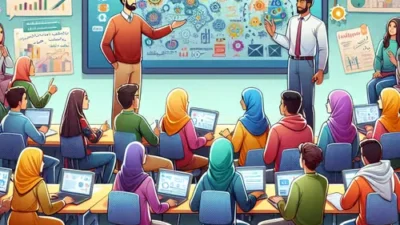Comprehending Fomo: What Is It and What Causes It?
Teens use social media platforms like Instagram, TikTok, and X (Twitter) on a daily basis to interact, share moments, and stay up to date with the latest trends.
However, despite the ease of communication and information access, social media also has a significant psychological impact, with one of the most notable phenomena being Fomo (Fear of Missing Out), which is the fear of falling behind on what is trending, friends’ activities, or new information.
Teenagers’ thoughts, behaviors, and identity formation are all impacted by the Fomo phenomena.
Many youngsters believe that in order to be “updated” and avoid being viewed as out of date, they must continuously check social media.
Teens are encouraged to engage in habits like screen addiction, social anxiety, and low self-esteem as a result.
Baca juga: The Impact of Online Learning on Education in the Digital Age
Teenagers’ Views on the Fomo Phenomenon
Teenagers’ digital lifestyles today are inextricably linked to the Fomo (Fear of Missing Out) phenomenon.
Teenagers often feel the need to be connected in order to stay up to date on information, trends, and their friends’ activities because social media platforms like Instagram, TikTok, and Snapchat are so widely used.
Most people believe that FOMO is a type of contemporary social pressure that gradually molds teens’ behaviors and perspectives.
They have a propensity to compare themselves to others too much because they place more emphasis on their online persona than on the caliber of in-person encounters.
FOMO is viewed by society and educators as a symptom that requires careful consideration.
Psychologists view FOMO as a trigger for emotional illnesses like anxiety, low self-esteem, and social stress, even if some youth view this as normal.
In order for youngsters to be not only active social media users but also intelligent and conscious of its psychological effects, the widespread consensus thus highlights the significance of digital literacy and character development.
Issues Teenagers Face As a Result of Fomo
Teenagers’ Fomo phenomenon leads to a number of issues and tangible effects that become more apparent as their use of social media increases.
Teenagers experiencing significant worry when they believe they are not following trends or are not viewed as “active” on the internet is one of the primary issues.
To avoid feeling left behind, they feel compelled to keep up their internet presence, share activities, and keep an eye on other people’s posts.
Additionally, their daily routine is thrown off balance, affecting their study time, sleep schedule, and in-person social connections.
Many kids are more concerned with how they look on social media than they are with developing genuine bonds with their friends and family.
However, because they frequently contrast their lives with the idealized ones that others present on social media, their self-confidence declines.
All of this adds up to psychological issues like mental exhaustion, social anxiety, and stress.
FOMO, however, is not necessarily associated with insignificant or consumptive issues.
Teenagers occasionally suffer from FOMO in relation to social and humanitarian concerns that are currently receiving a lot of attention, such as the Palestinian conflict, climate change, or social justice movements.
They feel compelled to participate, reshare content, or express their ideas out of a fear of being left behind in discussions or acts of solidarity.
The urge to always be involved in different global concerns can be emotionally taxing, even while this demonstrates a high level of concern.
Even though their ability is still restricted, teenagers may feel inadequate, overwhelmed, or guilty if they are unable to make a meaningful contribution.
Teenagers who experience Fomo thus suffer from it both personally and in terms of their ability to participate in social activities.
Teens must get wise direction from their parents, teachers, and the environment in order to utilize social media in a healthy way and to be critically aware of their digital involvement.
Effective Techniques for Teens to Address Fomo
Techniques for Teens to Lessen the Effect of FOMO in Their Lives so They Don’t Live in Constant Fear of Being Left Behind on Social MediaIn the current digital age, teens’ FOMO (Fear of Missing Out) issue has grown to be a significant problem.
Many youngsters believe that they must constantly be “connected” and participate in the different topics being discussed due to the increased activity on social media.
Numerous facets of their lives are affected by this, including their study habits, social interactions in the real world, and mental health.
FOMO, however, is not necessarily caused by unfavorable or consumerist factors.
In reality, a lot of youngsters suffer from FOMO because they feel excluded from significant concerns like social justice, climate change, and the Palestinian conflict.
This demonstrates concern and sensitivity, but it still requires direction to avoid causing undue emotional strain.
Here Are a Few Methods:
1. Instruction in Digital Literacy and Media Awareness
It is crucial that teens understand the functioning of social media.
They must understand that not everything they see on social media is a true representation of the world, and that algorithms are in place to keep users’ interest.
Schools should implement digital literacy programs to help teens think critically, evaluate information, and avoid getting sucked into the tide of content out of fear of falling behind.
2. Increasing Self-Esteem and Identity
Adolescents with a healthy sense of self-worth are less likely to be swayed by the pictures of others on social media. They can better focus on life and their own strengths by engaging in activities like writing, self-reflection, and gratitude exercises. In addition to digital accomplishments like the quantity of “likes” or followers, educators and parents can also actively praise the process.
3. Implement Digital Time Management
While social media offers many benefits, overuse can be detrimental to one’s productivity and mental well-being.
Teens should develop a measurable social media usage pattern as the solution.
Use the screen time reminder feature to cut down on excessive access.
Regularly partake in offline activities such as reading, working out, or spending time outdoors.
4. Promote Social Engagement in Real Life
Teens can feel appreciated without using social media by forming relationships in the real world.
To provide people time to engage with one another and promote in-person cooperation, families and schools might organize social events, group conversations, and community or organizational activities.
Self-confidence and stronger social ties may result from this.
5. Taking a Healthy Approach to Addressing Social Issues
It’s acceptable for teenagers to be concerned about topics like politics, climate change, and Palestine.
Actually, this shows that excellent social consciousness is growing.
They must be accompanied, though, so that: They don’t feel compelled to speak up if they’re not ready.
They don’t only follow trends; they have a thorough understanding of the problem.
They wisely express their ideas in accordance with their responsibilities and capacity.
Thus, rather than being a psychological burden, Fomo toward social issues can be a means of fostering empathy and human values.
6. Offer Psychological Assistance
Professional assistance is required if teenagers begin exhibiting symptoms of stress, mental exhaustion, or social anxiety as a result of social media pressure.
In order for children to open up to their own parents, parents should provide an open communication environment at home and schools should offer welcoming counseling services.
The Secret to Handling FOMO in the Modern Age: Self-Control and Literacy
Teenagers now frequently struggle with FOMO, or the fear of missing out, in their everyday digital lives.
Social pressure that affects their behavior and mental health is frequently brought on by the urge to constantly be connected and seem to live on social media.
Despite all of social media’s advantages, excessive and careless use can have detrimental effects.
Teens, parents, and the educational setting must thus work together to help them realize the value of using social media responsibly.
It is necessary to consistently establish digital literacy, self-control, and a balance between the actual and digital worlds.
Teenagers can develop into intellectual, emotionally stable adults who can handle the difficulties of the digital age in this way.
Baca juga: The Reasons and Practical Remedies for Indonesian Students&Reading Crisis
Conclusion
Fomo in teenagers is a real issue that has emerged as a result of social media and technology.
Although social media has many positive effects, it also creates social pressure that affects kids’ relationships with others, mental health, and responses to world events.
In many circumstances, Fomo is a show of care and a desire to engage, so it’s not always a terrible thing.
However, without the right guidance, this concern could turn into an emotional burden.
As a result, the suggested remedies ought to emphasize both strengthening and restriction.
Strengthening through the development of character, empathy, digital literacy, and emotional support.
Teenagers may learn to use social media healthy, critically, and responsibly—not as a source of pressure, but as a tool to develop and make a constructive contribution to society—if family, school, and the social environment are approached in a balanced and cooperative manner.
Penulis: Adinda Aisyah Humahira
Mahasiswa Jurusan Pendidikan Bahasa Arab, Universitas Muhammadiyah Prof. dr. Hamka
Dosen Pengampu: Doctor Muhammad Iman Sastra Mihajat, Ph.D.
Editor: Anita Said
Bahasa: Rahmat Al Kafi
Ikuti berita terbaru di Google News





